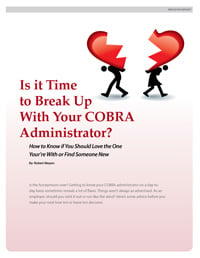As we close out the year, HR professionals managing COBRA face unique challenges—finalizing participant records, ensuring compliance, and preparing a seamless transition into the new year. At iTEDIUM, we’re committed to supporting you every step of the way. Here’s what you can do this December to ensure your COBRA administration is in top shape:
The COBRA Blog
Year-End COBRA Readiness: December Guidance for HR Teams
Managing COBRA Administration in the Fourth Quarter
Well, another football season is upon us. The weather is getting cooler, the leaves are turning, and the sun shines brightly on the football fields across America. The season includes parties, tailgating, fantasy football, and games at every level – from pee-wee league to pro.
Pondering COBRA Outsourcing? Three Factors to Consider:
Regardless of what you may have heard, COBRA administration continues to be required even with health reform and the elimination of pre-existing condition exclusions. That said, staying up to date with both the Affordable Care Act and COBRA compliance requirements can be overwhelming, and therefore, outsourcing COBRA administration has grown in popularity over the years. In 2004, the Society of HR Managers issued a study indicating that 38 percent of employers outsource their COBRA administration. In the last 10 years, that number has likely doubled.
Are You Making This COBRA Software Mistake During Open Enrollment?
Every year during open enrollment a few unsuspecting companies make a big HR mistake: They unwittingly allow their COBRA administration program to change along with their benefits plans. Sometimes it’s because the carrier recommends a different COBRA administrator. Sometimes it’s because a broker is offering free COBRA software. And sometimes, the broker and the HR team aren’t even conscious that the change is occurring because the COBRA administration was a free service provided by the old health insurance carrier.
Tags: cobra administration, cobra administrator, COBRA software, open enrollment, COBRA system, COBRA administration program
How to Choose a COBRA Administrator: The Top 10 Requirements
Do you trust your COBRA administrator? This is an important question because as health insurance rates have skyrocketed, so too has the liability associated with COBRA administration. The ACA removed limits from policies, and in doing so, lifted the lid on potential COBRA errors as well. Remember, COBRA is compliance at its heart and the regulatory penalties which may be levied by the Department of Labor are significant. The insurance claims which COBRA participants might incur can be even more dangerous to the health plan than the penalties.
COBRA Pop Quiz: Can Your Team Answer These 4 Questions Correctly?
No matter how long you work with COBRA, questions still arise. Here are four COBRA administration questions that caught our attention this month. Ready for a pop quiz? See if your team can answer these four questions correctly!
Tags: cobra administration, cobra
The news has been abuzz recently with several large corporate mergers and acquisitions. No doubt large corporations have teams of lawyers on staff to ensure compliance during and after corporate changes. However, even businesses that are not large enough to staff a team of lawyers undergo mergers, acquisitions and restructuring. While these businesses may not make the evening news, they are held to the same COBRA compliance standards as large employers.
COBRA Administration During Leaves of Absence: How to Navigate the Maze
We’ve covered many COBRA administration twists and turns through the years. As COBRA has evolved, the challenges continue to increase. Leaves of Absence (LOA) during employment has made COBRA even more complex. LOA used to be about sick time and vacation. Now it can include leaves for maternity, paternity, personal, family, childcare, medical, military, sabbatical, adoption, ADA and other reasons.
According to the CDC, marriage rates in the United States are increasing and divorce rates are decreasing. This is good news … unless you are a divorce attorney. It also has COBRA implications.
COBRA administration is anything but routine. In this article, we examine a few interesting situations that deserve the label “COBRA Curveballs.” Batter up!
Tags: COBRA compliance

.jpg)










